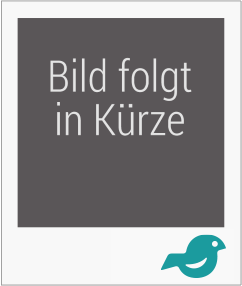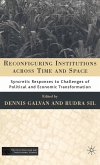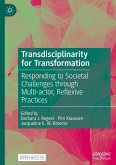Sustainability Transitions and Industrial Transformation
Multi-Sector Dynamics and Policy Perspectives
Herausgegeben:Steen, Markus; Thune, Taran Mari; Hansen, Teis; Mäkitie, Tuukka; Frenken, Koen
Versandkostenfrei innerhalb Deutschlands
38,99 €
inkl. MwSt.
Versandkostenfrei*
Erscheint vorauss. 14. März 2026
Melden Sie sich
hier
hier
für den Produktalarm an, um über die Verfügbarkeit des Produkts informiert zu werden.

19 °P sammeln
Sustainability Transitions and Industrial Transformation
Multi-Sector Dynamics and Policy Perspectives
Herausgegeben:Steen, Markus; Thune, Taran Mari; Hansen, Teis; Mäkitie, Tuukka; Frenken, Koen
- Gebundenes Buch
This open access book illuminates the significant transformation processes brought about by economy-wide shifts towards sustainable modes of production, distribution, and consumption. In particular, the accelerating industrial transformations towards sustainability, in response to global warming and planetary boundary constraints, bring a range of new research challenges.
By integrating perspectives from the interdisciplinary fields of innovation, policy, and sustainability transitions studies, the chapters offer novel conceptual and empirical insights into these complex processes,…mehr
Andere Kunden interessierten sich auch für
![Reconfiguring Institutions Across Time and Space Reconfiguring Institutions Across Time and Space]() Reconfiguring Institutions Across Time and Space52,99 €
Reconfiguring Institutions Across Time and Space52,99 €![Placemaking and Cultural Landscapes Placemaking and Cultural Landscapes]() Placemaking and Cultural Landscapes151,99 €
Placemaking and Cultural Landscapes151,99 €![Green Ice Green Ice]() Green Ice42,99 €
Green Ice42,99 €![Transdisciplinarity for Transformation Transdisciplinarity for Transformation]() Transdisciplinarity for Transformation38,99 €
Transdisciplinarity for Transformation38,99 €![Stories of Place Stories of Place]() Uma KothariStories of Place23,99 €
Uma KothariStories of Place23,99 €![Geography in the 21st Century Geography in the 21st Century]() Geography in the 21st Century328,99 €
Geography in the 21st Century328,99 €![Free the Land Free the Land]() Audrea LimFree the Land22,99 €
Audrea LimFree the Land22,99 €-
-
-
This open access book illuminates the significant transformation processes brought about by economy-wide shifts towards sustainable modes of production, distribution, and consumption. In particular, the accelerating industrial transformations towards sustainability, in response to global warming and planetary boundary constraints, bring a range of new research challenges.
By integrating perspectives from the interdisciplinary fields of innovation, policy, and sustainability transitions studies, the chapters offer novel conceptual and empirical insights into these complex processes, including on multi-system dynamics and digitalization. An essential read for both researchers and policymakers seeking to understand ongoing industrial transformations towards sustainability.
By integrating perspectives from the interdisciplinary fields of innovation, policy, and sustainability transitions studies, the chapters offer novel conceptual and empirical insights into these complex processes, including on multi-system dynamics and digitalization. An essential read for both researchers and policymakers seeking to understand ongoing industrial transformations towards sustainability.
Produktdetails
- Produktdetails
- Verlag: Springer, Berlin; Tik Centre Of Technology, Innovatio
- Artikelnr. des Verlages: 89549375
- Seitenzahl: 448
- Erscheinungstermin: 14. März 2026
- Englisch
- Abmessung: 235mm x 155mm
- ISBN-13: 9789819548927
- ISBN-10: 9819548926
- Artikelnr.: 75697709
- Herstellerkennzeichnung
- Libri GmbH
- Europaallee 1
- 36244 Bad Hersfeld
- gpsr@libri.de
- Verlag: Springer, Berlin; Tik Centre Of Technology, Innovatio
- Artikelnr. des Verlages: 89549375
- Seitenzahl: 448
- Erscheinungstermin: 14. März 2026
- Englisch
- Abmessung: 235mm x 155mm
- ISBN-13: 9789819548927
- ISBN-10: 9819548926
- Artikelnr.: 75697709
- Herstellerkennzeichnung
- Libri GmbH
- Europaallee 1
- 36244 Bad Hersfeld
- gpsr@libri.de
Markus Steen is Senior Research Scientist in the Department of Technology Management (research group Innovation and Sustainability) in SINTEF Digital. He holds a PhD in economic geography from the Norwegian University of Science and Technology (NTNU), Department of Geography, where he is also Associate Professor II. His research focuses on sustainability transitions, innovation, policy, industrial transformation and regional development. Taran Thune is Professor of Innovation at the Centre for Technology, Innovation and Culture at the University of Oslo and director of research centre INTRANSIT. Taran is particularly interested in policy questions and has published widely on research and innovation policy topics. Teis Hansen is Full Professor at the Department of Food and Resource Economics, University of Copenhagen, and Senior Research Scientist at the Department of Technology Management, SINTEF, Trondheim. He is also a member of the Danish Government’s expert group on the role of research in the green transition, and a Semper Ardens Accomplish grant holder of the Carlsberg Foundation. His research interests are located at the intersections of geography, innovation, sustainability and policy. Tuukka Mäkitie is Research Scientist at SINTEF Digital, and holds a PhD in innovation studies from University of Oslo, Norway. His research interests include sustainability transitions and green innovation in energy, transport and manufacturing sectors. He is particularly interested in the processes of novel value chain formation as a key part of the acceleration phase of sustainability transitions. Koen Frenken is Full Professor in Innovation Studies at the Copernicus Institute of Sustainable Development at Utrecht University. His research interests include evolutionary economics, institutional sociology and complexity theory. He works on breakthrough innovation, economic geography, platform economy and innovation policy.
Chapter 1.
Introduction: why this book and its contributions.
Chapter 2.
Understanding multi
system interlinkages between energy and mobility systems and their governance in the UK.
Chapter 3.
The sectoral configurations of the hydrogen innovation system in Norway.
Chapter 4.
Mapping multi
system interactions in urban contexts – a study of the energy, transport and food systems in the municipality of Gothenburg.
Chapter 5.
The multi
sectoral interactions of electrification in Norwegian coastal shipping.
Chapter 6.
Conceptualising multi
system configurations: The case of hydrogen in Germany.
Chapter 7.
Pulling the brake: Worldwide institutional reactions to Uber’s entry.
Chapter 8.
(Re)interpreting circularity? Understanding the contested directionalities of the Swedish heavy
duty vehicle sector towards the Circular Economy.
Chapter 9.
Captains of industry? Value chain relations and sustainability reorientation of firms.
Chapter 10.
Navigating paradoxes in sustainability transitions: how incumbent firms (can) foster circular economy.
Chapter 11.
Digitalization and platformization for sustainability: The case of the oil and gas industry.
Chapter 12.
Making oil and gas smarter, not greener: Fossil fuel incumbents’ corporate venture capital investments in digital entrepreneurs during sustainability transitions.
Chapter 13.
The scope and outcomes of transformative policy missions: A conceptual framework and empirical exploration of Swedish industry decarbonization.
Chapter 14.
The more the merrier? A study on multiple mission
specific innovation systems in the Dutch energy sector.
Chapter 15.
The transformative capacity of green industrial policy.
Chapter 16.
Navigating twin transitions: a policy framework to align digital innovation with sustainability, applied to the Dutch processing industry.
Chapter 17.
Multi
system dynamics, industrial transformation and transition policy: Future research priorities.
Introduction: why this book and its contributions.
Chapter 2.
Understanding multi
system interlinkages between energy and mobility systems and their governance in the UK.
Chapter 3.
The sectoral configurations of the hydrogen innovation system in Norway.
Chapter 4.
Mapping multi
system interactions in urban contexts – a study of the energy, transport and food systems in the municipality of Gothenburg.
Chapter 5.
The multi
sectoral interactions of electrification in Norwegian coastal shipping.
Chapter 6.
Conceptualising multi
system configurations: The case of hydrogen in Germany.
Chapter 7.
Pulling the brake: Worldwide institutional reactions to Uber’s entry.
Chapter 8.
(Re)interpreting circularity? Understanding the contested directionalities of the Swedish heavy
duty vehicle sector towards the Circular Economy.
Chapter 9.
Captains of industry? Value chain relations and sustainability reorientation of firms.
Chapter 10.
Navigating paradoxes in sustainability transitions: how incumbent firms (can) foster circular economy.
Chapter 11.
Digitalization and platformization for sustainability: The case of the oil and gas industry.
Chapter 12.
Making oil and gas smarter, not greener: Fossil fuel incumbents’ corporate venture capital investments in digital entrepreneurs during sustainability transitions.
Chapter 13.
The scope and outcomes of transformative policy missions: A conceptual framework and empirical exploration of Swedish industry decarbonization.
Chapter 14.
The more the merrier? A study on multiple mission
specific innovation systems in the Dutch energy sector.
Chapter 15.
The transformative capacity of green industrial policy.
Chapter 16.
Navigating twin transitions: a policy framework to align digital innovation with sustainability, applied to the Dutch processing industry.
Chapter 17.
Multi
system dynamics, industrial transformation and transition policy: Future research priorities.
Chapter 1.
Introduction: why this book and its contributions.
Chapter 2.
Understanding multi
system interlinkages between energy and mobility systems and their governance in the UK.
Chapter 3.
The sectoral configurations of the hydrogen innovation system in Norway.
Chapter 4.
Mapping multi
system interactions in urban contexts – a study of the energy, transport and food systems in the municipality of Gothenburg.
Chapter 5.
The multi
sectoral interactions of electrification in Norwegian coastal shipping.
Chapter 6.
Conceptualising multi
system configurations: The case of hydrogen in Germany.
Chapter 7.
Pulling the brake: Worldwide institutional reactions to Uber’s entry.
Chapter 8.
(Re)interpreting circularity? Understanding the contested directionalities of the Swedish heavy
duty vehicle sector towards the Circular Economy.
Chapter 9.
Captains of industry? Value chain relations and sustainability reorientation of firms.
Chapter 10.
Navigating paradoxes in sustainability transitions: how incumbent firms (can) foster circular economy.
Chapter 11.
Digitalization and platformization for sustainability: The case of the oil and gas industry.
Chapter 12.
Making oil and gas smarter, not greener: Fossil fuel incumbents’ corporate venture capital investments in digital entrepreneurs during sustainability transitions.
Chapter 13.
The scope and outcomes of transformative policy missions: A conceptual framework and empirical exploration of Swedish industry decarbonization.
Chapter 14.
The more the merrier? A study on multiple mission
specific innovation systems in the Dutch energy sector.
Chapter 15.
The transformative capacity of green industrial policy.
Chapter 16.
Navigating twin transitions: a policy framework to align digital innovation with sustainability, applied to the Dutch processing industry.
Chapter 17.
Multi
system dynamics, industrial transformation and transition policy: Future research priorities.
Introduction: why this book and its contributions.
Chapter 2.
Understanding multi
system interlinkages between energy and mobility systems and their governance in the UK.
Chapter 3.
The sectoral configurations of the hydrogen innovation system in Norway.
Chapter 4.
Mapping multi
system interactions in urban contexts – a study of the energy, transport and food systems in the municipality of Gothenburg.
Chapter 5.
The multi
sectoral interactions of electrification in Norwegian coastal shipping.
Chapter 6.
Conceptualising multi
system configurations: The case of hydrogen in Germany.
Chapter 7.
Pulling the brake: Worldwide institutional reactions to Uber’s entry.
Chapter 8.
(Re)interpreting circularity? Understanding the contested directionalities of the Swedish heavy
duty vehicle sector towards the Circular Economy.
Chapter 9.
Captains of industry? Value chain relations and sustainability reorientation of firms.
Chapter 10.
Navigating paradoxes in sustainability transitions: how incumbent firms (can) foster circular economy.
Chapter 11.
Digitalization and platformization for sustainability: The case of the oil and gas industry.
Chapter 12.
Making oil and gas smarter, not greener: Fossil fuel incumbents’ corporate venture capital investments in digital entrepreneurs during sustainability transitions.
Chapter 13.
The scope and outcomes of transformative policy missions: A conceptual framework and empirical exploration of Swedish industry decarbonization.
Chapter 14.
The more the merrier? A study on multiple mission
specific innovation systems in the Dutch energy sector.
Chapter 15.
The transformative capacity of green industrial policy.
Chapter 16.
Navigating twin transitions: a policy framework to align digital innovation with sustainability, applied to the Dutch processing industry.
Chapter 17.
Multi
system dynamics, industrial transformation and transition policy: Future research priorities.







